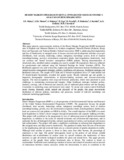Desert Margins Program In Kenya: Integrated Socio-Economics Analysis Of Benchmark Sites
Date
2004Author
Nyariki, Dickson M.
Maina, I. N.
Muturi, G. M.
Mulatya, J.
Ego, W.
Muthoka, P.
Kariuki, J.
Esilaba, A. O.
Cheruiyot, H. K.
Metadata
Show full item recordAbstract
This paper presents socio-economic analysis of the Desert Margins Programme (DMP) benchmark sites in Kajiado and Makueni Districts in Southern rangelands, Marsabit District (Kalacha, Kargi, Korr and Ngurunit) and Turkana District (Turkwel ecosystem). DMP is addressing land degradation and loss of biodiversity in marginal areas. It focuses research and development activities on people (livelihoods, food security, leadership, culture, indigenous knowledge system, level of modern knowledge/training, poverty); environment (vegetation trends, land degradation, biodiversity, land use systems) and natural resources management (NRM) policies. During characterisation of benchmark sites, stratified random sampling was used to sample 180 respondents. Data was collected by questionnaire and analysed using the Statistical Package for Social Scientists (SPSS). The livelihoods approach was used to describe, explore and predict interactions between livelihood assets, natural resources management strategies, policies, institutions and processes, livelihood strategies and livelihood outcomes. The sample of 97 male and 83 female respondents from 157 male-headed and 23 female-headed households, revealed fair gender parity. Results indicated age and gender as important demographic characteristics in decision-making structures and resource-ownership regimes. The main occupations were crop and livestock production, which were perceived to pose challenges to maintaining environmental integrity. Other livelihood strategies included pottery, basketry, carvings, sale of firewood and charcoal, sale of medicinal plant extracts and bee keeping. Constraints to marketing crops and livestock were noted. To secure and sustain current livelihood assets (human, financial, social, natural and physical) of the people, this paper recommends facilitation of relevant policies, institutions and processes, transfer of relevant knowledge and enhanced marketing opportunities
Collections
- Journal Articles (BE) [333]

